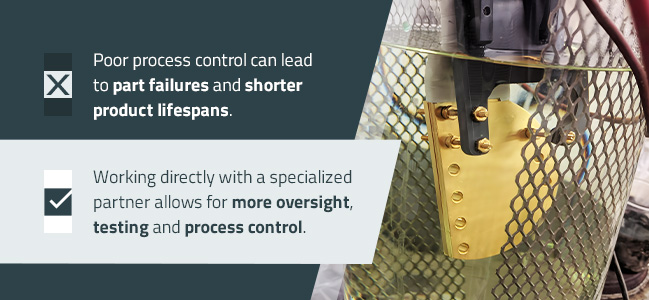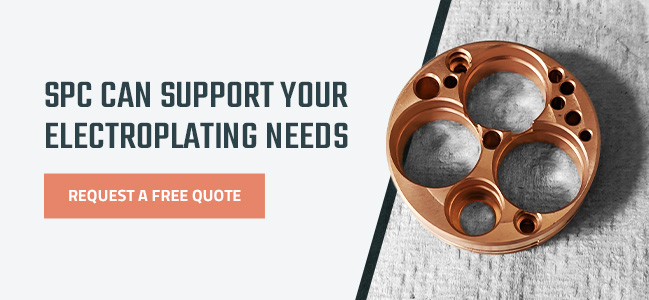
Industrial manufacturing is a complex ecosystem. From part sourcing to shipping, building an effective supply chain requires reliable connections and the resources to maintain them. Industries like semiconductors and electronics depend on specific components to maintain production. When shortages happen due to global or local events, the entire chain can stall.1 Manufacturing brokers act as go-betweens to help operations diversify and cut costs.
While brokers can improve efficiency and reduce risks, they can also increase manufacturing complexity. Finding the right solution means understanding the pros and cons of manufacturing brokers. Let’s see how brokers can help and why direct alternatives might be better for your business.
How Brokers Fit Into the Modern Supply Chain
A manufacturing broker is an agent that matches buyers and suppliers based on project requirements.2 Unlike distributors, brokers do not hold inventory or own production assets. Instead, they:
- Coordinate Requests for Quotes (RFQs)
- Negotiate supplier terms
- Schedule production
- Consolidate delivery
- Manage logistics
Brokers juggle the entire production cycle across multiple manufacturers to help businesses get the components they need.
Brokers are one way manufacturers navigate the modern supply chain. Companies partner with brokers to find build-to-order or just-in-time solutions without needing in-house capabilities. Orders are now tied to immediate demand cycles instead of stocking and forecasting. They’ll find providers offering the lowest prices or fastest capabilities, even if you’ve never worked with that group.
Key Advantages of Using Manufacturing Broker Services
Manufacturing brokers have become a solution for companies that need rapid production without maintaining infrastructure. Businesses working within small or specialized markets need a partner who can provide material access quickly. Brokers are one of the potential solutions. They can help streamline procurement, support flexibility, and provide access to exclusive networks.
Streamlined Procurement and Inventory Optimization
One of the biggest benefits of manufacturing brokers is the ability to manage different orders through one contract. Instead of getting quotes from multiple vendors and managing their shipments, you let brokers handle the paperwork. Businesses simplify their accounting and procurement process by working with one broker.
Brokers often group orders across different customers, which lets you order based on demand. Electronics and hardware companies order specific quantities when they need them. Holding excess inventory can increase storage costs while ordering on-demand can increase inventory flexibility for companies.3
Supply Chain Flexibility
Brokers can contribute to greater supply chain flexibility. If one factory is backed up, brokers can shift production to another network facility. Agility in sourcing suppliers can cut down on delays for some industries.4 This flexibility is critical for handling changing demand. The faster you can respond to changes, the more competitive your business is. A broker diversifies your sourcing options without starting from scratch every time.
Access to Selective and Exclusive Supply Networks
Brokers can provide access to exclusive manufacturers in their networks. Factories with specialty equipment for circuit board assembly or metal finishing can be difficult to reach. If you need complex or low-volume parts, brokers can give you time- and cost-saving access. They have an established network ready to provide support.
Potential Drawbacks of Relying on Brokers
However, relying on a broker’s network can come with trade-offs. Poor consistency and lead time concerns can create more problems for your business. Ensure you account for the disadvantages of manufacturing brokers before entering into a partnership.
Challenges With Quality Assurance and Consistency
Not all suppliers follow the same standards, and it might not be clear who is doing the work. This lack of visibility can be risky, especially for tightly regulated industries.5 Advanced processes like semiconductor plating require transparency to prevent these issues.6

Because brokers work with third-party factories, you might not know who’s making your parts. Poor process control can lead to part failures and shorter product lifespans. Working directly with a specialized partner allows for more oversight, testing and process control.
Lead Time Management and Customization Limitations
Brokers use their network to find available capacity quickly, but that doesn’t always mean faster turnaround. Brokers don’t control the factory, so they can’t always prioritize your business or give accurate updates. Even then, infrastructure issues can drive lead times up more if you’re sourcing from faraway vendors.7
Customization can be more difficult through brokers. Brokers might lack connections if a part needs a unique material or surface finish. Additionally, detailed specifications require close communication work.8 Without direct purchasing, customization may be slow or impossible. For example, coatings with strict environmental control, such as finishes applied to titanium, demand specialized capabilities.
SPC offers clean plating conditions that many broker-sourced vendors cannot guarantee. This level of contamination control is critical for applications where inconsistent finishes or particulate contamination can cause failure.
Cost-Benefit Analysis: Brokers vs. Direct Purchasing
Cost is a major influence on choosing between brokers and a direct solution. Everything from the total cost of ownership (TCO) to the hidden costs needs consideration.
Evaluating Total Cost of Ownership
The base part price is only a piece of the TCO for industries like semiconductors and electronics.9 Costs such as delays, reworks or poor quality can quickly add up. If you lack visibility and control over production, these costs can turn a cheap part into an expensive TCO. Direct suppliers will work with you to create the results you want on your timeline. This insight means a higher upfront cost but better quality and a TCO that is less impacted by the variability of broker sourcing.
Impact on Vendor Relationships and Negotiation Power
Going direct helps build long-term relationships. This connection increases your negotiating power, leading to faster service, better pricing and more flexibility.10 Brokers can be useful for one-off or surprise jobs, but you miss out on the loyalty. If your company has steady production needs, stronger partnerships create better results.
Selection Criteria for Manufacturing Businesses
While cost is important, it’s not everything. The right vendor should align with your technical needs, timelines and goals. A partner must be able to manage your complex requirements while maintaining consistency at scale. Make sure to explore a vendor’s:
- Integration capabilities: Projects often need advanced production capabilities.11 You need an experienced partner for coatings like electroless nickel or conductive finishes. SPC supports full integration from edge break to final coating. Companies working with non-metallic parts that require adhesion-critical surface prep cannot work with just anyone. SPC controls each stage of the process to ensure coatings meet your demands.
- Quality assurance protocols: Quality assurance can make or break your business. Do potential partners follow industry standards like ISO 9001 or IPC specifications?12 Do they conduct rigorous testing for thickness and other characteristics? Direct manufacturers with specialized skills usually offer clear insight into their testing protocols.13
- Goals: Will the supplier support your goals? Whether you’re entering a regulated market or scaling production, you need a provider who can help you succeed. Look for suppliers with technical expertise and strategic support. They can directly improve product reliability and support your growth.
Making the Right Decision for Your Manufacturing Business
Manufacturing brokers can offer speed and vendor flexibility but might lack transparency and custom capabilities. Direct suppliers can deliver the quality control and process consistency you need to succeed.14 If you’re dealing in specialized electroplating — especially on plastics or refractory materials — you need a technically capable partner committed to industry-leading quality.
How SPC Can Support Your Electroplating Needs
SPC offers complete oversight and controlled environments to ensure your business gets the metal plating and finishing services it deserves. We specialize in metal finishing for plastics, ceramics and other non-metallic substrates used in high-performance applications.15 Our team offers specialized coatings, robust testing and scalable production capacity. We have almost a century of experience in the plating industry, so you can count on SPC to give you unmatched results and value. If you’re evaluating broker vs. direct options, we invite you to explore how our vertically integrated approach can improve your production consistency. Reach out to us for your free quote today.16

Endnotes:
- https://www.sharrettsplating.com/industries/plating-semiconductors
- https://pmc.ncbi.nlm.nih.gov/articles/PMC8704334/
- https://www.e-jwj.org/journal/view.php?doi=10.5781/JWJ.2023.41.4.5
- https://www.ipc.org/TOC/IPC-4552wAm-1-2.pdf
- https://pmc.ncbi.nlm.nih.gov/articles/PMC9740177/
- https://www.sharrettsplating.com/coatings/enepig
- https://www.mdpi.com/2072-666X/14/8/1538
- https://www.sharrettsplating.com/blog/what-is-electrocleaning/
- https://research.njit.edu/smart/electroless-electrochemical-deposition
- https://www.sharrettsplating.com/blog/plating-defense-against-corrosion/
- https://www.sharrettsplating.com/blog/electroless-nickel-plating-cost/
- https://www.sciencedirect.com/science/article/abs/pii/S0921509324007871
- https://www.sciencedirect.com/science/article/abs/pii/S0169433223008978
- https://ieeexplore.ieee.org/document/10173290
- https://environment.ec.europa.eu/topics/waste-and-recycling/rohs-directive_en
- https://www.epa.gov/rcra/resource-conservation-and-recovery-act-rcra-regulations
- https://www.sciencedirect.com/science/article/abs/pii/S0167577X20308090
- https://pmc.ncbi.nlm.nih.gov/articles/PMC9044480/
- https://pmc.ncbi.nlm.nih.gov/articles/PMC11050928/
- https://www.sciencedirect.com/science/article/pii/S2307187724000440
- https://jeas.springeropen.com/articles/10.1186/s44147-023-00309-2
- https://www.sciencedirect.com/science/article/pii/S2238785424002400
- https://pmc.ncbi.nlm.nih.gov/articles/PMC8704334/
- https://www.nature.com/articles/s41598-025-94508-x
- https://www.mdpi.com/1996-1944/14/24/7874
- https://www.sharrettsplating.com/about/
- https://www.sharrettsplating.com/quotes/



